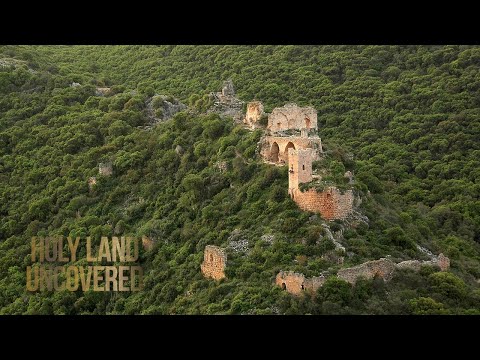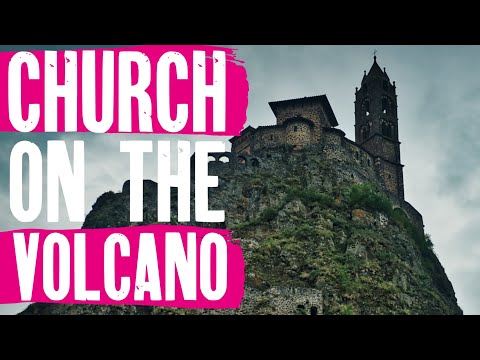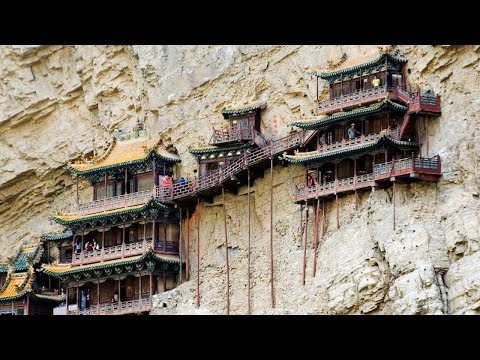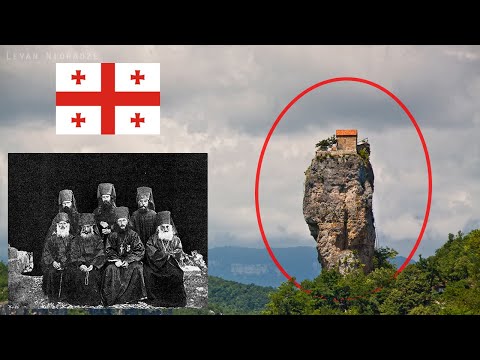10 Montfort Castle, Israel
Perched upon a steep, narrow cliff within Israel’s Nahal Kziv nature reserve, Montfort Castle is a ruined Crusader fortress built on land purchased by the Teutonic Order of Knights in 1220. Its name derives from the French words “mont,” meaning mountain, and “fort,” meaning strong. Montfort was the Teutonic Order’s principal castle in the Holy Land, but it wasn’t originally built for military purposes. In fact, it was constructed with the objective to move some of the Order’s archives and treasury from its founding city of Acre to a more isolated location. This was a strategic move for the Teutonic Order. They were under substantial pressure from the Knights Templar and other military monastic orders in Acre at the time, who had plans of taking it over. With a name literally meaning “strong mountain,” they probably would have had a hard time doing so at Montfort Castle.[1]
9 Chapel of Saint-Michel d’Aiguilhe, France
Reached by climbing 268 rock-carved steps, the Chapel of Saint-Michel d’Aiguilhe (St. Michael of the Needle) was built in 969 on a volcanic plug 85 meters (279 feet) high. The towering volcanic core sits in the center of the French village of Le Puy-en-Velay, which is itself situated in a valley surrounded by the remnants of ancient volcanoes. The village had long been a sacred destination in its own right, and the local bishop felt compelled to build the chapel to mark his return from a pilgrimage to the shrine of St. James in Spain. Since then, it has marked the starting point of the Via Podiensis pilgrimage route. Like many lofty, sacred Christian spaces, the chapel is dedicated to the archangel Michael. This is likely due to his tendency to appear on mountain tops and other high places. Given the magnificent views from the chapel, it’s little wonder that even an archangel would be able to appreciate the location.[2]
8 Gaztelugatxeko Doniene, Spain
Dating from the 10th century, this hermitage dedicated to John the Baptist stands atop an islet on the coast of Biscay in Spain’s Basque Country. The Basque coast is notoriously turbulent in this area, where numerous tunnels, arches, and caves are created by the sea’s relentless erosion. The name “Gaztelugatxeko” comes from a combination of Basque words meaning “rock castle.” Watch this video on YouTube Connected to the mainland by a stone bridge, the hermitage can be accessed by a narrow path and 241 steps. According to legend, anyone who reaches the hermitage after the strenuous climb should ring its bell three times and make a wish. Whether anyone has wished for fewer steps remains unknown.[3]
7 Sumela Monastery, Turkey
Dedicated to the Virgin Mary, the Greek Orthodox Sumela Monastery teeters at a height of 1200 meters (3,937 feet) on an enormous cliff face on Melá Mountain in Turkey. It is one of the oldest monasteries in the Christian world, founded in the 4th century by two priests. Its current form was created during the 13th century and, to locals, it’s known as “Meryem Ana,” which may come from the word “Melas,” meaning black. This may allude to the Karadaglar mountains on which it rests, the name of which means black, or possibly to the black color of the icon of the Virgin Mary. Watch this video on YouTube Despite numerous periods of national upheaval, the monastery remained occupied until 1923. Following forced population exchanges between Turkey and Greece after the War of National Liberation, it was finally deserted. Then, in 1930, most of the wooden components of the monastery were destroyed following a devastating fire that caused major destruction. Fortunately, after undergoing extensive renovations, it now serves as a major tourist attraction for anyone who isn’t afraid of heights.[4]
6 The Hanging Temple, China
Built over 1,500 years ago, the Hanging Temple sits on a sheer precipice of a cliff near Mount Heng in China’s Shanxi Province. Despite looking like it may fall at any minute, the structure is kept securely in place with oak crossbeams slotted into holes that have been chiseled into the cliffs. It is especially unique because it is the only existing temple dedicated to a combination of the three traditional Chinese philosophies. It enshrines mostly Buddhist deities, as well as Taoism and Confucianism. Watch this video on YouTube According to legend, a single monk named Liao Ran began construction on the temple in 491. Numerous repairs and extensions have resulted in its present scale and appearance, which encompasses forty halls and pavilions built into cliffs over 30 meters (98 feet) from the ground.[5]
5 Popa Taungkalat Temple, Myanmar
Located in central Myanmar, this temple stands on top of a 225-meter (738-foot) tall volcanic plug. The rock formation was formed by geological activity around Mount Popa, an extinct volcano rising 1,518 meters (4,980 feet) above sea level. Meaning “flower” in Sanskrit, Popa is considered the most sacred mountain in Myanmar, believed to be a source of Nat spiritual energy. Popa Tuangkalat (“Pedestal Hill”) Temple is one of several spectacular buildings that can be explored at the top of the rock formation. To reach this scenic complex of monasteries, shrines, and stupas, you’d have to climb the 777 steps leading up to it. Make sure you’re in really good shape before you attempt to reach this one![6]
4 Monastery of the Holy Trinity, Greece
One of several monuments enjoying panoramic views from the cliffs of Meteora, the Monastery of the Holy Trinity is the most notoriously difficult to reach. Balanced on a steep, pillar-like rock, it rises some 300 meters (984 feet) above the town of Kalabaka. However, if you’re feeling adventurous enough, you can reach it by climbing a steep trail and stairs used by the monks. Evidence indicates that the monastery has existed here since at least the year 1362 and was probably founded by a monk who lived on the cliff. Like most of the monasteries at Meteora, the Agia Triada, as it’s known in Greek, fell into decline and was eventually abandoned by the early 20th century. It also suffered heavy damages during the Second World War, with one of its main buildings burning to the ground. Thanks to extensive renovations during the 1970s, however, anyone wanting a good thigh workout is still able to visit it today.[7]
3 Paro Taktsang, Bhutan
Also known as the Tiger’s Nest Monastery, the Paro Taktsang is a cultural icon of Bhutan and is cloaked in legend. The sacred Vajrayana Himilayan Buddhist structure is perched on the cliffside of the upper Paro Valley and was built around a cave in 1692. Guru Padmasambhava, who is credited with introducing Vajrayana Buddhism to Bhutan, meditated and practiced with his students in the cave. Some seriously intriguing legends surround this site. According to some, Padmasambhava flew to this location on the back of a tigress, and the site was consecrated to tame a tiger demon. Another story holds that the former wife of an unknown emperor became a disciple of Padmasambhava in Tibet. She transformed herself into a tigress and carried the Guru on her back to the site of the current Paro Taktsang. Padmasambhava then meditated in one of the caves and emerged in eight incarnated forms, thus making the site holy. Although you won’t find any flying tigers for a convenient ride up now, you’ll still recognize the sacred majesty of this monastery if you visit.[8]
2 Church of Katskhi Pillar, Georgia
This church, dedicated to Maximus the Confessor, sits atop a natural limestone monolith known to locals as the Pillar of Life. Considered a symbol of the True Cross, the 40-meter (131-foot) high Katskhi Pillar has become surrounded by legends. To add to the mystery, it wasn’t until 1944 that researchers were finally able to climb and survey the site for the first time and reveal some of its secrets. The early medieval hermitage at the top of the monolith dates from the 9th or 10th century. It’s so difficult to reach that an 18th-century Georgian scholar wrote how nobody is able to ascend the pillar, nor does anyone know how to do so. Little wonder then, that no other written accounts of monastic life or ascents survive.[9]
1 Abuna Yemata Guh, Ethiopia
One of 35 rock-hewn churches in the Tigray Region of Ethiopia, Abuna Yemata Guh is located at a height of 2,580 meters (8,465 feet). The church entrance is only accessible via a steep and hazardous ascent with hand and footfalls cut into the rock. Visitors can reach it by crossing a natural stone bridge with a sheer drop on either side, followed by a fine, narrow wooden footbridge. (Wasn’t that a scene in some movie?) The church itself is known for its well-preserved wall paintings and domes, dating back to the 5th century. The paintings are themed around the nine saints and twelve apostles and linked to the initial traces of Christianity in Ethiopia. If you’re really eager to see these beautiful images, then it’s best to push any fear of heights aside to brave the perilous ascent.[10]
























